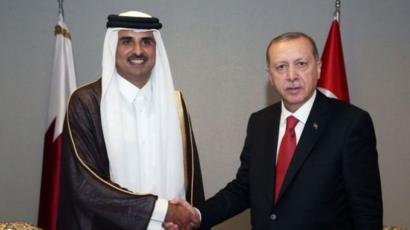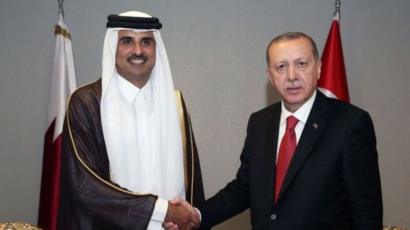Monday 17 February 2020
Press statement
The Observatory for Terrorism and Human Rights at the Forum for Development and Human Rights Dialogue has issued a report on armed Muslim Brotherhood movements and their supporting countries as violations and crimes committed by the terrorist group against humanity.
The 42-page report confirmed that the Muslim Brotherhood is behind the establishment of 13 armed movements that carried out terrorist operations in Egypt between 2013 and 2019.
The report also confirmed that the Muslim Brotherhood, which is classified as a terrorist in many countries, including Egypt, is the reference group for all violent terrorist organizations in the Middle East and the world, which adopts a speech that incites violence, racism, hatred and exclusion against women and the religious extremism, yet enjoys the support and sponsorship of countries that adopt that approach, namely Qatar and Turkey, which finance, sponsor and support that terrorist organization and shelter on its territory the leaders and elements of the group wanted before the Egyptian judiciary for terrorist crimes that have caused the loss of innocent civilian victims.
Over the past six years, the Brotherhood has tried to “legalize” the issue of embracing violence following the June 30, 2013 revolution, overthrowing its rule and falling its dream, which it has been looking for for the past 90 years, forcing it to form dozens of specific armed cells with multiple names, all adopting theories of atonement, and the methodology of armed violence.
Some of these movements came out of the brotherhood’s womb, following the group’s transition from structural cells to cluster cells, which were formulated after the fall of their movements popularly and politically inside Egypt, in addition to the movements that came out of the womb of Salafist jihad and polarizing currents that were taken from the ideas of Sayyid Qutb and Abu al-Alawi al-Muddwi as a reference to the armed confrontation on the Egyptian street and the targeting of civilians and military under the pretext of establishing the Islamic caliphate project put forward by Hassan al-Banna since the 1930s. Armed Brotherhood movements and cells have been active in setting fires, sabotage and bombing, using improvised explosive devices, car bombs, and carrying out assassinations against symbols of Egyptian society and targeting civilians and military personnel, under the banner of establishing the Caliphate State Project.
The 13 movements are the Ultras of Revolutionary Girls, which carried out sabotage on the campus, al-Azhar University, and attacked a large number of sovereign areas in the Egyptian state, Yolo Block Rabaawi, who set fire to the building of the Mobilization and Recruitment Department, and Helmia Al-Zaytoun Park, belonging to the armed forces, by throwing Molotov cocktails burning inside it and the soldiers of Egypt organization which carried out a series of bombings, in front of the Cairo Security Directorate, In front of the research metro station in Duqki, and in the vicinity of the police station Talibiya al-Haram, in addition to targeting a security patrol in Al-Haram Street and Ansar al-Sharia Brigades in The Land of Kanneh, which included a number of brotherhood leaders fleeing Wadi Al-Natroun prison in 2011, and recruited youth, and sent them to Syria and its members were responsible for the martyrdom of a number of police officers.
The report revealed the establishment of members of the group for the Molotov movement, which appeared in February 2014, which announced the establishment of a military wing called “Brigades dedicated to targeting statesmen, journalists, leaders of the interior, army, government and businessmen, as well as the execution movement that targeted police officers, burning their cars, and the Revolutionary Punishment Movement, a bombing near the Fayoum Security Directorate and the bombing of electricity towers in the city of media production, as well as the organization of the Revolution Brigade, which was responsible for the assassination of Colonel Adel Rajai, The commander of the 9th Armored Division in front of his house and the Decisive Movement, which tried to assassinate Dr. Ali Jumaa, former Mufti of the Republic and the assassination of Assistant Attorney General Zakaria Abdulaziz in the first settlement with a car bomb, exploded near his house targeting his convoy minutes later, and in August 2019, the movement claimed responsibility for the incident of the Institute of Oncology. The group carried out more than 26 reprisals against the state following the June 30, 2013 revolution, including an assassination attempt on former Interior Minister Mohammed Ibrahim,
the bombing of the Russian plane and the attack on armed forces units and police checkpoint in Sinai.
The report showed that the al-Morabitoun and Ansar al-Islam organizations, founded by Hisham Ashmawy and his assistant Imad al-Din Abdul Hamid, broke up the Rabaa armed sit-in and targeted the police and army forces, where Ansar al-Islam claimed responsibility for the oases attack, while al-Mourabitoun was responsible for several specific terrorist operations, such as The bombing of the headquarters of the Directorate of Security of Daqahliya, where 16 people were martyred, the massacre of the Al-Farafra ambush in 2014, and the martyrdom of 21 soldiers, and the third massacre of Al-Arish, which martyred 29 individuals, the terrorist group celebrated these operations on its channels with a documentary.
According to the report, Jund al-Islam, an al-Qaeda-affiliated entity made up of salafist jihadists in the Gaza Strip, was responsible for the September 11, 2013 bombing of the Rafah military intelligence building, which killed six soldiers and injured 17 others.
Thereport confirmed the lack of accountability of the terrorist Muslim brotherhood and the continued support of some countries encouraged them to plan more of these subversive operations, relying on changing those organizations to their names so that the parent group remains far from any accusation, and the cycle of violence expanded to include other countries such as Syria and Libya, where the group found in Turkish military movements a bridge to communicate between its elements and elements of other organizations under its banner supporting the new Ottoman caliphate, which Turkey seeks not to It was restored through its direct occupation of territories in Syria and Libya, and before that the establishment of Turkish military bases in Qatar, the same for the State of Qatar, which violated its non-cooperation with the anti-terrorism measures implemented by the Arab Quartet countries the International Convention on the Suppression of Terrorist Financing issued by UN General Assembly Resolution 54/109,dated December 9, 1999, issued on January 10, 2000, which In its preamble, it condemned all acts of terrorism, its methods and practices, as unjustifiable criminal acts, wherever they were committed and whoever the perpetrators were, including endangering friendly relations between States and peoples and threatening the territorial integrity and security of States.
The report stated that the support of Turkey and Qatar for the Brotherhood violates paragraph 3 (f) of General Assembly Resolution 51/210 of December 17,1996, in which the Assembly asked all countries to take steps, by appropriate internal means, To prevent the financing of terrorists and terrorist organizations, stressing that the lack of accountability of that group and its supporting countries with their crimes against the Egyptian people and the peoples of the Arab region and the world, is the biggest catalyst for the continuation of the terrorist act based on extremist and violent ideology in the world and the failure of all UN efforts to contain the terrorist phenomenon.







